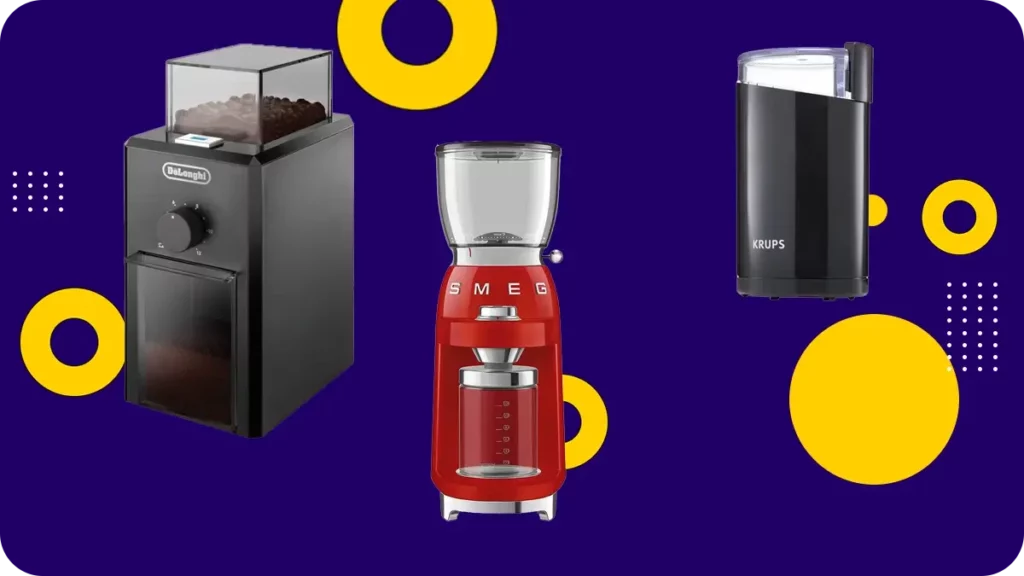Sourcing high quality coffee beans is the first step in creating perfect coffee, but investing in a good coffee grinder is a close second.
If you don’t know where to start with your coffee grinders, we’ve got all the details you need to know so you can invest in the right coffee grinder for you.
What are manual coffee grinders?
Manual coffee grinders are hand held devices used to grind your coffee beans. They feature a mechanism which is turned manually to break down the whole beans into smaller grounds.
They usually feature a few different ground settings, meaning you can choose how coarse or fine your coffee grounds are.
Manual coffee grinders are usually made up of material like glass and stainless steel, and use a burr mechanism to grind the beans.

What are electric coffee grinders?
Electric coffee grinders do the exact same job as manual coffee grinders, except they do everything for you.
Once your grinder is full of whole beans, all you need to do is select your grind option of choice and the machine will quickly and efficiently grind your coffee.
Electric grinders tend either be made up of blades or burrs.

What is a burr grinder?
A burr grinder, or burr mill, is made up of two revolving abrasive surfaces in which the coffee is ground between.
The beans are crushed between a moving grinder wheel and a non-moving surface.
The distance between the two surfaces can be altered, changing the size of your coffee grounds.
What’s the difference between a manual grinder and an electric grinder?
As mentioned above, electric coffee grinders operate on the same principles as a manual coffee grinder, but they do all the hard work for you.
Electric grinders also tend to have more customisation in the grinding process, with added features such as grind settings, dosing straight into your espresso machine (bean-to-cup machines) and even built in scales.
Pros and cons of manual grinders
When deciding whether or not to buy a manual coffee grinder, there are a few different pros and cons to be considered.
Is a hand grinder better than an electric grinder?
Whether you prefer a hand grinder over an electric grinder is completely up to personal preference, but there are a few features which make coffee drinkers lean towards hand grinders.
Precision
Many people may assume your coffee won’t be as high quality compared to that of an electric grinder, but this is false.
The level of precision you can achieve with manual burr grinders rival some of the best electric grinders on the market.
The fact the grind settings can be adjusted so precisely with very little waste means you can control the grind with a huge amount of accuracy.
Portability
One of the best things about a manual coffee grinder is the size and potability of them.
They are great for travelling and having at work, and they are usually quite light to carry.
Minimal noise
Electric coffee makers can be noisy, especially when you’re using them first thing in the morning!
If you want to eliminate that noise, then a manual coffee grinder may be the right option for you. Although it does make a small amount of noise, the difference between an electric machine is massive.
Capacity
Manual coffee grinders are only designed for one or two cups of coffee at a time.
If you are having a larger group gathering or have family members around and plan on having lots of coffee at one time, an electric grinder may be the better option for you.

Is it better to hand grind coffee?
In theory, manual coffee grinders should produce a better tasting coffee as the amount of friction is considerably less than an electric coffee grinder.
Manual grinders don’t heat up the beans during grinding compared to an electric grinder, which slightly increases the coffee’s temperature for a short period of time.
However, if you find the motion of grinding the coffee hard to do, an electric grinder may be a better choice.
Depending on the make and model you choose, there will be varying degrees of effort you’ll have to assert to rotate the arm. Some devices can take a minute to grind the coffee, whilst others may take longer.
This can be particularly difficult if you suffer from conditions that affect your wrist movements or grip.
Can you use a manual grinder for espresso?
If you’re grinding your coffee for coffee devices such as filter machines or caferiere’s, then you should be fine using a manual grinder.
However, as we’ve mentioned, it can take some time to grind the coffee.
If you wish to use a manual coffee grinder for an espresso machine, you may have to grind it for around 3-5 minutes to create fine coffee grounds that are suitable.
Pros and cons of electric grinders
Ease of use
The main advantage of an electric coffee grinder is that you don’t need to use any muscle power like you do with a manual one.
The grinder will do all the hard work for you, either through the use of electricity or batteries. It also holds more coffee beans than a manual.
Time efficient
Another great advantage is how quick electric grinders are. They will grind the coffee beans down much quicker than we could with a manual grinder.
Customisation
Most electric grinders will have a few different grind options to choose from, allowing you to create different grinds for different types of machines.
Noise
There’s no hiding from the fact electric coffee grinders are much louder than manual coffee grinders. Both the sound of the machine working and the crackling of grains will certainly wake up a household.
Do electric grinders make better coffee?
Depending on the make and model of your electric grinder, you will be able to create great tasting coffee. Electric grinders are great for creating different size coffee grounds at a larger quantity, making them ideal for a variety of different coffee machines.
As discussed, they do cause a lot of friction which can cause the coffee grounds to heat up during the grinding process. However, this can be altered through the grind time set.
Whether you prefer to use an electric or manual coffee grinder is all down to personal preference and how you enjoy your coffee.


